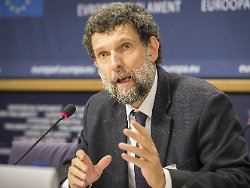Friday, May 21, 2021
Gezi process rolled out again
Turkish court indicts acquitted
An Istanbul court is reopening the process surrounding the protests in Gezi Park in 2013. In a first trial, the 16 defendants were acquitted. Critics speak of a purely politically motivated move. The judges seem to be amalgamating proceedings, in some cases arbitrarily.
Almost eight years after protests critical of the government in Turkey, a court in Istanbul is reopening a controversial case on the events of the time. In the new trial, 16 defendants have to answer, some of whom have already been acquitted in the first instance. Among them is the cultural promoter Osman Kavala, who has been imprisoned for more than three and a half years, and who is also accused of espionage. The journalist Can Dündar, who lives in Germany, is also charged.
Critics see the new process as being purely politically motivated. Kavala himself called the judiciary’s approach arbitrary and drew comparisons to the time of National Socialism. He compared his situation to a “baton that is handed over during a relay race”. “Various judges and courts surrendered my arrest without dropping it.” In particular, the espionage allegations against him resembled the criminal offense of “treason” common under National Socialism, he said. An application for his release from custody was denied. The trial is now set to continue on August 6th. In January an appeals court decided that the proceedings should be reopened.
Osman Kavala suffers massively from his detention
Like Dündar, seven defendants are abroad. Their proceedings had originally been severed. Kavala and the rest of the defendants were acquitted last year. However, he was then arrested again on the basis of new allegations in connection with the attempted coup in 2016, and the proceedings were merged with the one that had just begun. His lawyer Köksal Bayraktar reported that Kavala was already suffering physical and mental damage from the long solitary confinement. The largely peaceful Gezi protests in the summer of 2013 were initially directed against the development of Gezi Park in the center of Istanbul. They expanded into nationwide demonstrations against the authoritarian policies of the then Prime Minister and now President Recep Tayyip Erdogan. The government brutally suppressed the protests.
Several defendants testified on the first day of the trial. The process generated a great deal of interest. Numerous media representatives and international observers were turned away partly due to lack of space. Corona distance rules could not be adhered to. Kavala himself was connected via video from prison. His wife Ayse Bugra, a professor, was among the audience. The merger of the proceedings has been criticized by human rights activists and lawyers. The allegations had nothing to do with each other, it was said. In its decision, the appellate court also called for it to be merged with the so-called Carsi trial. The decision on this is still pending. During the Gezi protests, a fan club of the Besiktas football club called Carsi played an important role.
35 Besiktas fans are accused of attempted coup
The prosecution had accused a total of 35 football fans, among other things, of having used the Gezi protests as an excuse to overthrow the government. In December 2015, they were acquitted for lack of evidence. The verdict was overturned last month. Fikret Ilkiz, another of Kavala’s attorneys, said if the proceedings were merged, the process would take many years. “We cannot tolerate that.”
Erdogan had publicly referred to Kavala several times in the past as the man behind the Gezi protests and his acquittal as a “maneuver”. The European Court of Human Rights had ordered Kavala’s release in December 2019 because there was not enough evidence against him.
Born in Paris, Kavala runs one of the largest publishing houses in Turkey and, with his organization Anadolu Kültür, advocates dialogue between ethnic groups, for example in the Kurdish conflict or with the Armenians. He was also one of the founders of the Turkish branch of the Open Society Foundation of the US philanthropist George Soros. The foundation promotes democratic movements in numerous Eastern European countries. Soros, who is of Hungarian-Jewish descent, is the enemy of many populists.
.
